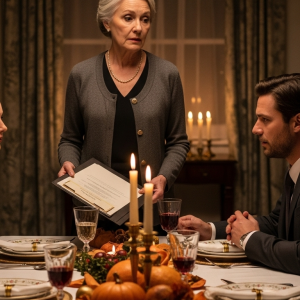“You’re such a useless old woman.”
Amanda’s voice cut through the Christmas morning laughter like a blade. I stood up from the dinner table, looked her straight in the eye, and said, “Then stop calling me when you need money.” What she did next would force me to dial 911 within minutes. But first, let me explain how a perfect Christmas morning descended into chaos.
I’m Margaret Foster—Maggie to most. At 67, I thought I’d seen every flavor of family drama. I was wrong.
The morning started beautifully. I arrived at my son Brian’s home at 10:00 AM sharp, carrying my famous apple crisp and gifts for my grandchildren, Jake and Emma. The house smelled of cinnamon and pine. For a few hours, everything felt perfect. We opened presents, we laughed, and I helped my daughter-in-law, Amanda, in the kitchen. That’s where it began to unravel.
“Margaret,” Amanda said, pulling the turkey from the oven. “Could you grab the desserts?” I looked at the counter: pie, cake, a store-bought tart—but no sign of my crisp.
“Where did you put my crisp?” I asked, a small knot forming in my stomach.
Amanda’s expression barely flickered. “Oh, that. I put it in the pantry. Honestly, store-bought is just more convenient for cleanup.” The casual cruelty of it was a small, sharp sting.
“I’ve been making that for thirty years,” I said, my voice level. “It’s Jake’s favorite.”
“Well, people’s tastes change,” she said with a shrug. I should have let it go. But something in her dismissive tone made me push back.
“Amanda, I spent three hours making that. The least you could do is serve it.”
Her mask slipped. “Three hours?” Her voice rose. “Three hours to make a dessert nobody even asked for? This is exactly what I’m talking about, Margaret. You just assume we need you here at all.” The kitchen fell silent. From the living room, I could hear my family laughing, oblivious.
“I brought dessert because that’s what family does,” I said quietly.
Amanda’s eyes flashed. “Let me tell you what family doesn’t do, Margaret. Family doesn’t criticize how we parent our children. And family doesn’t expect to be catered to just because they’re old.”
I stared at her, realizing every well-meaning gesture I’d ever made had been cataloged as an offense. “I was trying to help.”
“You were trying to control,” she hissed. “Just like you always do.”
The accusation that truly struck me was about the gifts. The “strings attached,” she called them.
“What strings, Amanda?”
“The money, Margaret,” her voice cut through my protest. “Let’s talk about the money. The little ‘loans’ you give Brian that you never expect to be repaid. Do you think that doesn’t come with strings? Do you think we don’t feel obligated to include you because of your generosity?”
I felt like she’d punched me in the stomach. “I give Brian money because I love him.”
“You give him money because it makes you feel needed! It gives you power over our lives. You keep a running tab in your head, don’t you? Jake’s braces, Emma’s summer camp, the mortgage payment last year.”
I opened my mouth to deny it, but I hesitated. Hadn’t I felt a sting of resentment when my help went unappreciated? Amanda saw it and pounced. “I knew it. You do keep track.”
Dinner was a masterclass in dysfunction. Brian was oblivious. The kids were cheerful. But every time my eyes met Amanda’s, I felt the radiating tension. The lie came when my granddaughter Emma asked for the apple crisp.
“Oh, Grandma didn’t bring apple crisp this year, honey,” Amanda said smoothly. But Jake, my wonderful, observant Jake, wasn’t fooled.
“But I saw the dish in the pantry,” he said. Amanda’s smile tightened. “Sit down, Jake,” she snapped, her voice sharp enough to make both kids freeze.
Later, I tried to leave, but Amanda cornered me in the kitchen. “I suppose you’re proud of yourself,” she said, scraping a plate with unnecessary force. “Making me look bad in front of my own children.”
“Amanda, what is this about?”
She turned on me, abandoning all pretense. “What you’re missing is that this is my family, my home, and I decide who is welcome. You can’t just erase me from their lives!” I shot back.
She laughed, a sound devoid of all warmth. “Threatened by you? Margaret, look at yourself. You’re 67 years old, you live alone, and the only reason anyone pays attention to you is because you write checks.”
“If that’s how you see me, why do you keep accepting my money?”
“Because we have to!” she admitted, her voice tight with resentment. “But that doesn’t mean we have to pretend we enjoy having you hover over us.”
The honesty was brutal. My financial support wasn’t a gift received with love; it was a toll she paid to have me in her life. A peculiar clarity washed over me. “You’re right,” I said quietly. Amanda looked surprised.
“You’ve just given me the most valuable gift I could have asked for this Christmas,” I continued. “You’ve given me the truth. And now that I know where I stand, I can make some adjustments.”
I walked out of that house feeling strangely liberated. Brian followed me to the door, carrying my untouched apple crisp. “Mom, is everything okay? You seem different.”
“I’m fine, sweetheart. Just thinking about some changes I need to make in the new year.”
Back in my quiet apartment, I sat at my kitchen table and made a list—an accounting of every loan and gift I’d given them over the past five years. The total was staggering: over $43,000. For too long, I’d been buying tolerance and calling it love. That ended tonight.
My phone rang. It was Brian. Amanda had likely sent him to smooth things over, to ensure the financial pipeline wasn’t disrupted. I let it go to voicemail. When it rang a third time, I finally answered.
“Mom, thank God,” Brian’s voice was panicked. “Listen, there’s been a situation here. Amanda… she’s called the police.”
My blood ran cold. “What happened?”
“She says you threatened her. Says she feels unsafe. The officers are here now, and they want to speak with you.”
The world tilted. After all the cruelty, Amanda was playing the victim, and she was using the police to do it. Twenty minutes later, I was explaining the situation to Officer Patricia Wells, a no-nonsense woman who looked like she’d seen it all.
“Officer, my daughter-in-law told me today that my role in her family is purely financial. When I said I understood and would adjust my expectations accordingly, she apparently interpreted that as a threat.”
Officer Wells made notes. “What kind of financial help are we talking about?”
I handed her the list. “Approximately $43,000 over the past five years. Today, I learned I was actually paying for the privilege of being treated poorly.”
The officer studied me. “Did you make any statements that could be interpreted as threats?”
“I told her that if our relationship was purely financial, we should treat it as such. No more family gatherings. No more pretense. That doesn’t sound like a threat to a reasonable person.”
“But Amanda isn’t reasonable,” I continued. “She’s been systematically isolating me from my family while maintaining access to my bank account. Today, when I said I wouldn’t continue enabling it, she panicked.”
Officer Wells closed her notebook. “Mrs. Foster, I’m not seeing any evidence of threatening behavior here.”
After she left, I realized something profound. I wasn’t heartbroken. I was angry—cleanly, purely angry. By calling the police, Amanda had made a critical error. She had forced our private conflict into the open, where under objective examination, she looked exactly like what she was: a manipulative bully.
That night, I didn’t reply to Brian’s texts begging to “sort this out.” Instead, I opened my laptop. Amanda had always been vague about her past. I started searching court records for “Amanda Mitchell,” her maiden name, in the Denver area.
I found it. Amanda J. Mitchell, sued by a former employer in 2014 for embezzlement. The case was settled out of court, but the initial filing was public. She’d been accused of systematically stealing from client accounts. The timeline fit perfectly. She’d met Brian a year later, a woman in need of a new life built on someone else’s stable foundation.
The next day, my own financial records revealed the truth was even worse. The total I had given them was over $67,000 in five years. Many of the “emergencies” had occurred during months when Brian’s salary should have been more than enough to cover their expenses. It was clear someone was siphoning money from their household budget.
That evening, I received a phone call that changed everything. “Mrs. Foster, this is Detective Sarah Reeves, Denver PD Financial Crimes Unit. Your internet searches triggered some alerts. Amanda Mitchell is a person of interest in an ongoing investigation.”
I barely slept. The next morning, I was sitting in Detective Reeves’s office, staring at a file with Amanda’s photo on it.
“Mrs. Foster, Amanda Mitchell has been using multiple identities for at least ten years,” the detective explained. “She’s been married twice before under different names. In both cases, she systematically drained her husband’s finances before disappearing.”
I felt sick. “What about my son? The children?”
“The children are his. But Amanda has been running a long-term con on your family. She has a secret apartment, a second car, and all the signs indicate she’s been preparing to disappear again.”
“If you know all this, why haven’t you arrested her?”
“We needed more evidence of active fraud,” Detective Reeves said, leaning forward. “Your information gives us what we need to move forward. Mrs. Foster, we want you to help us catch her in the act.”
The plan was elegantly simple. I would offer Amanda something she couldn’t refuse: a large, early inheritance for the family, structured in a way that would require her to reveal her hidden accounts.
Three days later, I met her at a downtown coffee shop, a location monitored by the police. “Amanda,” I began, playing the part of a remorseful mother-in-law. “I was wrong on Christmas. I want to make amends. I’m prepared to give the family a gift of $200,000.”
Her eyes lit up, a flicker of pure greed she couldn’t hide. “That’s… very generous, Margaret.”
“There are tax implications,” I continued, reciting the script the detectives had given me. “I’ll need information on all your family’s accounts, including any personal ones you use, so we can structure the transfer properly.”
This was the moment. A legitimate person would involve their spouse. A con artist would seize control.
“I can provide that information,” she said quickly. “Honestly, I handle all our financial planning anyway. It would be easier if we just worked directly together.”
Over the next twenty minutes, she handed me everything. Not just their joint accounts, but three others I’d never heard of, including a business account for a “consulting company” she owned. Our entire conversation was being recorded.
As I walked to my car, Detective Reeves called. “We got everything we needed, Mrs. Foster. Three of those accounts are under false names, and one has been receiving regular transfers from your family’s joint account. We’ll be making an arrest tomorrow morning.”
The next morning, I got the call I’d been waiting for. It was Brian, his voice shaky and broken. “Mom… Amanda’s been arrested. They’re saying she’s wanted for fraud in three states. They’re saying she’s not even who we thought she was.”
That afternoon, I sat in my quiet apartment with a cup of tea and a slice of my apple crisp, finally served at the right temperature. Amanda was in custody. Brian and the children were devastated but safe. And I, at 67 years old, had my dignity back. I had learned that it’s never too late to stand up for yourself, and the best revenge is simply refusing to be anyone’s victim ever again.




